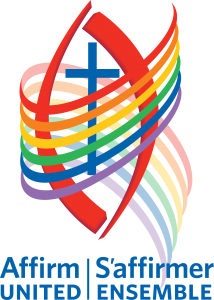The United Church has a new(ish) vision and purpose statement. They are key elements of a strategic plan designed to shape the next three years. The Vision reads:
Called by God, as disciples of Jesus, the United Church of Canada seeks to be a bold, connected, evolved church of diverse, courageous, hope-filled communities united in deep spirituality, inspiring worship and daring justice.
Deep Spirituality
Bill’s response shocked the minister. They were completing an exercise in confirmation class. The program involved a monthly session with youth in grade 9 and their mentors. Each young person was partnered with an adult in the congregation. Each pair attended the monthly session and then had a second meeting with just the two of them, following an outline that got them to explore the subject of the class further. This particular session was on prayer
All class activities were undertaken by both youth and mentors. Early in the lesson, the minister invited the pairs to take their place along a line. At one end were those who never prayed outside of worship and the other end was for those who prayed every day. Often the youth fell somewhere in the middle. Many of them had been taught a bedtime routine of prayer, and some still recited the prayer of their childhood. What the minister wasn’t prepared for was one of the adults landing in the never pray end, but that was what Bill did.
Bill was a retired educator who was recruited as a mentor because he was skilled at drawing out young people who were there because their parents had forced them to be. He was often paired with a teen who would likely need a little coaxing to attend and participate. Bill was also an active member of the congregation – a trustee and a member of council. He had words of wisdom and insight in each of these settings. His input was valued. Most Sundays, he attended worship. Bill had a grandchild who needed a heart transplant before their first birthday, so his experience with stress was firsthand. But here he was sharing that he never prayed.
To be fair, Bill, was likely more typical than atypical of his generation of men. Many years earlier, one of the previous ministers at the church held monthly men’s lunches where the men of the congregation shared a meal together and discussed a topic. But that had long ended. Unless they attended a study group, there was no opportunity for men to gather to pray beyond worship compared to the opportunity that the UCW offered women for spiritual exploration and experiences. Once the shock passed, the minister found dismay took its place. How had the church failed to offer the tools the people needed to build a stronger relationship with God?
That is what Spirituality is: drawing close to God, to build relationship with God. In worship, we do that corporately – as a congregation. But what tools do we have and need to do it privately? Prayer is certainly one. Prayer is opening our lives to God. It can be with words or through music or using many other forms. For some people, it is solitude in nature. For others, it is quieting and settling themselves with tools like meditation or mandalas, the original adult colouring activity. For others it is journalling daily or weekly.
For Bill, it was worship, and that experience formed him into a person dedicated to serving his church. Would his experience of God been more personal if he had had other tools, like a prayer practice or a group to talk with, to deepen his connection with God?
What our new vision and call statement says is that this experience of connection with God is the starting point for each of us. It is grounded in worship and prayer, study and scripture, song and story. And it looks and feels different for each of us. Deep spirituality is the joy of those who know they are loved and held by God in their everyday living, and in response, do their best to maintain their connection in whatever way works for them and God. Deep spirituality is the cornerstone of our identity, not just as a church but also as individuals who consider themselves disciples of Jesus.
Bold Discipleship
Laurence Fishburne, a well-known and talented Black actor, stars in a movie called Akeelah and the Bee. This is not about honeybees. In this move, Fishburne is a teacher who commits his time to working with an 11-year-old Akeelah to help her prepare to compete at the National Spelling Bee.
Akeelah is keen to chase this dream, but partway through the preparation for the bee she loses focus. Fishburne has her memorizing boxes of words, and quite honestly, she is bored by the enterprise. Not surprising really. Working out next steps leads to a conversation between the two about discipline which could change our understanding of what discipleship is.
You see, Fishburne explains that discipline is what gives life to learning. The word discipline, like the word disciple, comes from the Latin disciplulus, which means pupil. Like discipline, discipleship is the act of giving life to learning.
If spirituality is connection with God, then discipleship is how that connection shapes us. Discipleship is where our understanding of God connects and impacts our lives. Here we are in the season after Pentecost, ordinary time, when our scripture takes us back to the ordinary stories of Jesus ministry and teaching. We hear stories of the disciples, of what they were learning, doing and sharing. We hear of Jesus teaching and healing and loving.
In a few minutes we are going to hear a passage from John’s gospel where we witness the moment Jesus was called to leave his private his private life to take up his public ministry. For years he has lived in community as Jesus, son of Joseph. He’s supported his mother and his siblings; he’s apprenticed under his father. In this passage, Jesus attends a wedding with is mom, and when the wine runs out (a huge hospitality faux pas) Mary, in true mother fashion, nudges Jesus and points out the problem with a “you can make this better” tone in her voice. It’s almost as if she’s been watching from the sidelines wondering when he would finally live into the calling that was so obvious to everyone else? Had she been worried that his sense of familial connection would keep him from his calling? Has she noticed a restlessness in him? No matter the reason, she nudges Jesus, and he isn’t too please with her for doing it. He almost hints that he would rather continue with his comfortable quiet life, a life that was like all his neighbours. But whether it’s Mary’s prompting or his own yearning, the moment has come when Jesus needs his life to reflect his calling and he changes water into wine.
This is often how we talk about call, as though it is some dramatic moment where life changes completely. Consequently, we reserve talking about call for people who like me, going into ministry, do things that are shaped by a decision to live into their faith in a more obvious way. We miss seeing how our personal stories are connected to God’s holy story.
Take this story as an example. An older woman was a person of deep faith, but if you were to task her about her calling and what it might be, she would have fumbled for an answer. But to everyone else it was obvious. She fed people. This lovely woman was forced to leave school early to care for her younger siblings due to her own mother’s illness. When she finally left home, it was to work as a domestic. Then she served in the Navy as an officer’s cook. After the war, she was responsible for the cashiers in a Toronto-based chain of supermarkets. When she quiet working to have a family, apart from caring for her family and entertaining others, she was always the person in charge of meals at the church: fundraising meals, celebratory meals, and so forth, in fact, when friends described the church as God’s house, their four year old looked at the woman, and asked her if she cooked God’s meals? Long before the practice became widespread this lovely older lady was part of initiatives to make sure struggling families had the supplies, they needed for Christmas suppers. In every experience of her life, she was devoted to helping people have the food they needed. Surely that is just as sacred a calling as being a minister.
Discipleship is seeing how our lives are a sacred calling and out, of faith connecting our gifts with the world’s needs. Discipleship is how our lives become avenues of God’s love and presence in the world. Let us be bold in claiming every moment of every day as an expression of how God is caring
Daring Justice
In the Bible, especially in the Hebrew Scriptures, two words are often paired together: righteousness and justice. Righteousness is to be in right relationship with God, It is the experience deep spirituality and bold discipleship; it is the bond between God and us that shapes our lives. Justice is the bond between God and God’s people that shapes the world. Justice is what moves faith from the individual experience of “me in my small corner” to all of us as a church together in the world.
Justice is when each of us brings our different gifts together as one. Justice is living as the body of Christ as described in 1 Corinthians 12. Although the reading we will hear in a minute end with a list of gifts, what follows is the famous passage where Paul likens the church to a body, nothing that a body needs many parts just as the body of Christ needs many gifts. Justice is when United Church people and United Church congregations work together to sponsor refugees in response to the Syrian crisis. Justice is when United Church people and congregations support the Canadian Foodgrains bank to be able to provide food security around the world. Justice is when United Church people and congregations admit our painful role in residential schools and commit to reconciliation. While Canadians may have been shocked by unmarked grace, I think many United Church folk only had their worst fears confirmed. We already knew how destructive the residential school program had been and what a painful chapter our participation in them is in our life as church. Justice is when United Church people and congregations march in Pride parades and speak out against the violence suffered by the @S and LGBTQIA+ community. Justice is when our response is collective and transformative. Justice is bringing our different gifts together to move the world closer to God’s intention for fullness of life for all.
Daring justice is when we respond to the world in faith, not out of fear. Many congregations are mired in fear because the future of communities of faith in general and of the community they love in particular are uncertain. Their decisions become guided by what involves the least risk: the least risk of upsetting some one, the least risk to their financial sustainability, the least risk on many different fronts. Daring justice is the call to be found together in faith and to respond together in faith – not fear. So, let us be daring as we glimpse God’s vision for a world transformed, trusting that God, whose ways we seek to live into, will not forsake or forget us but will dare us to leave our fears behind to be in the world as people of deep spirituality, bold discipleship, and daring justice.
* Worship liturgy provided by the United Church of Canada. www.united-church.ca


